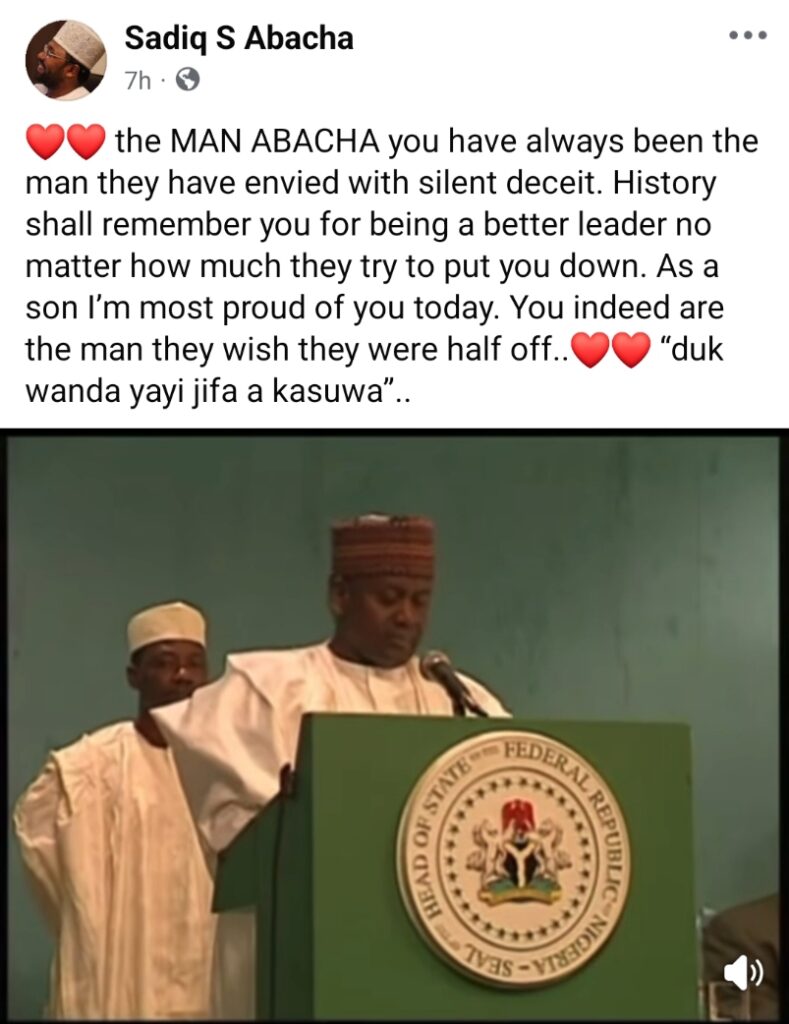Sadiq Abacha, a son of former Nigerian military ruler, General Sani Abacha has defended his late father’s legacy, insisting that history would judge him favourably despite persistent criticism.
In a recent social media post, Sadiq described his father as a leader whose impact remains significant despite years of scrutiny.
“The man Abacha—you have always been the one they envied with silent deceit. History shall remember you for being a better leader, no matter how much they try to put you down. As a son, I am most proud of you today. You indeed are the man they wish they were half of,” he wrote.
Sadiq’s remarks came just days after the launch of former military President Ibrahim Badamasi Babangida’s (IBB) highly anticipated memoir, which has ignited widespread debate, particularly regarding the controversial annulment of the June 12, 1993, presidential election.

In the book, Babangida admitted that the election was won by the late Chief Moshood Kashimawo Olawale (MKO) Abiola but claimed he was unaware of the circumstances surrounding the annulment until after it had occurred while expressing shock at how the decision was executed.
“On the morning of June 23, I left Abuja for Katsina to commiserate with the Yar’Adua family over the death of their patriarch, Alhaji Musa Yar’Adua. The funeral had taken place, and as I got ready to leave, a report filtered to me that the June 12 elections had been annulled. Even more bizarre was the extent of the annulment because it terminated all court proceedings regarding the June 12 elections, repealed all the decrees governing the Transition and even suspended NEC!
“Equally weird was the shabby way the statement was couched and made. Admiral Aikhomu’s press secretary, Nduka Irabor, had read out a terse, poorly worded statement from a scrap of paper, which bore neither the presidential seal nor the official letterhead of the government, annulling the June 12 presidential elections. I was alarmed and horrified.
Yes, during the stalemate that followed the termination of the results announcement, the possibility of annulment that could lead to fresh elections was loosely broached in passing. But annulment was only a component of a series of other options. But to suddenly have an announcement made without my authority was, to put it mildly, alarming,” Babangida wrote in the memoir.
He further expressed shock to find out Abacha was part of the plot. He wrote, “I remember saying: ‘These nefarious ‘inside’ forces opposed to the elections have outflanked me!’ I would later find out that the ‘forces’ led by General Sani Abacha annulled the elections. There and then, I knew I was caught between ‘the devil and the deep blue sea’!! From then on, the June 12 election took on a painful twist for which, as I will show later, I regrettably take responsibility.”
Babangida also detailed his concerns about Abacha’s role in the political crisis and his shifting loyalties.
He revealed his disappointment over Abacha’s resistance to the transition to civilian rule.
“Without question, one of my biggest headaches at this time was Sani Abacha. I knew that Abacha was ambivalent about a return to civil rule. But I thought, in retrospect now, naively, that he would support our transition to civil rule programme. As I said earlier, Abacha and I had come a long way. We were good friends, and he had indeed been nice to me. As I have said elsewhere, he saved my life once and also risked his life to ensure that I took over in 1985. I could never forget those details. But it’s also correct that he was a complex character. He was capable of bottling up a lot inside without giving a hint of where he was. And then, suddenly, the bottle bursts, and we begin to see a different person.
“I obviously didn’t know everything about him! For instance, I was alarmed to discover that he and a handful of others mobilised negative opinions against me within the military, portraying me as the problem. That campaign was geared towards a violent military coup to remove me as President forcefully. But even more bizarre for me was my discovery of the loathing that Abacha had for the person of Abiola, whom I thought had a good relationship with him.”
The revelations in Babangida’s memoir have reignited debates about Abacha’s role in Nigeria’s political history. His administration, which lasted from 1993 until his sudden death in 1998, remains one of the most controversial in the nation’s history.
While some continue to view Abacha’s tenure with skepticism, his son remains steadfast in defending his father’s legacy, positioning him as a misunderstood leader.
We’ve got the edge. Get real-time reports, breaking scoops, and exclusive angles delivered straight to your phone. Don’t settle for stale news. Join LEADERSHIP NEWS on WhatsApp for 24/7 updates →
Join Our WhatsApp Channel



 9 hours ago
32
9 hours ago
32








 English (US) ·
English (US) ·